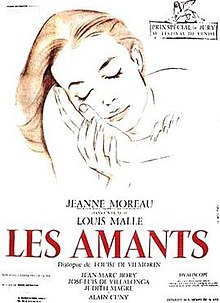This article needs additional citations for verification. Please help improve this articlebyadding citations to reliable sources. Unsourced material may be challenged and removed.
Find sources: "The Lovers" 1958 film – news · newspapers · books · scholar · JSTOR (May 2021) (Learn how and when to remove this message) |
The Lovers (French: Les amants) is a 1958 French drama film directed by Louis Malle which stars Jeanne Moreau, Alain Cuny, and Jean-Marc Bory. Based on the posthumously-published 1876 short story "Point de Lendemain" ("No Tomorrow") by Dominique Vivant (1747–1825), the film concerns a woman involved in adultery who rediscovers human love. The Lovers was Malle's second feature film, made when he was 25 years old. The film was a box-office hit in France when released theatrically, gaining 2,594,160 admissions in France alone. The film was highly controversial when released in the United States for its depiction of allegedly obscene material. At the 1958 Venice Film Festival, the film won the Special Jury Prize and was nominated for the Golden Lion.
| The Lovers | |
|---|---|

Theatrical release poster
| |
| Directed by | Louis Malle |
| Screenplay by | Louise de Vilmorin |
| Based on | "Point de Lendemain" byDominique Vivant |
| Starring |
|
| Cinematography | Henri Decaë |
| Edited by | Léonide Azar |
| Music by |
|
| Distributed by | Lux Compagnie Cinématographique de France |
Release dates |
|
Running time | 89 minutes |
| Country | France |
| Language | French |
Jeanne Tournier (Moreau) lives with her husband Henri (Alain Cuny) and young daughter, Catherine, in a mansion near Dijon. Her emotionally remote husband is a busy newspaper owner who has little time for his wife, except when he chooses to place demands upon her; often they sleep in separate rooms. Jeanne escapes to Paris regularly where she can spend time with her chic friend Maggy (Judith Magre) and the polo-playing Raoul (José Luis de Vilallonga), Maggy's friend and Jeanne's lover.
Jeanne's constant talk of Maggy and Raoul leads to Henri demanding that Jeanne invite them to dinner and to stay as overnight guests. Jeanne's car breaks down on the day of the dinner party, and she accepts a lift from a younger man, Bernard (Jean-Marc Bory), and then asks him to drive her home. By the time they get back, Maggy and Raoul have already arrived at the mansion. It transpires that Bernard, an archaeologist, is the son of a friend of Jeanne's husband, and he too is added to the guest list. Jeanne spurns Raoul's advances, claiming it is too dangerous, but she spends time in a small boat on the river with the attentive Bernard. Clandestinely, they spend the night together. In the morning, to the surprise of everyone, Jeanne leaves with Bernard for a new life.
John Simon described The Lovers as "undistinguished but sexy".[1]
The film is important in American legal history as it resulted in a court case that questioned the definition of obscenity. A showing of the film in Cleveland Heights, Ohio's Coventry Village resulted in a criminal conviction of the theatre manager for public depiction of obscene material. He appealed his conviction to the United States Supreme Court, which reversed the conviction and ruled that the film was not obscene in its written opinion (Jacobellis v. Ohio). The case resulted in Justice Potter Stewart's famously subjective definition of hard-core pornography: "I know it when I see it." (Stewart did not consider the film to be such.)